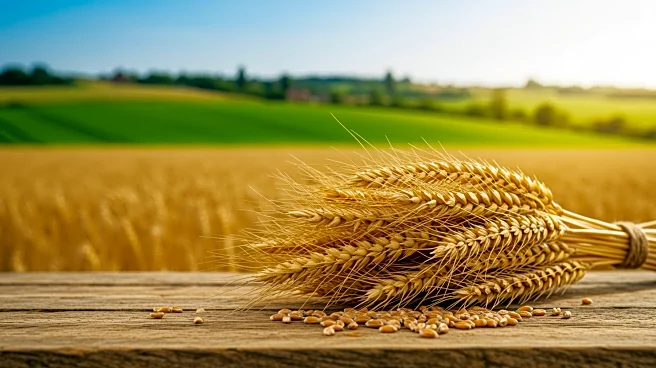What's Happening?
The 10th annual Kansas Governor’s Summit on Agricultural Growth convened in Manhattan, bringing together over 300 farmers, educators, and leaders to discuss strategies for economic growth in the state's agriculture industry. Since its inception in 2016, the summit has served as a platform for valuable discussions and networking, aimed at producing tangible results for Kansas agriculture. Governor Kelly emphasized the importance of the agricultural sector to the overall health of the economy, highlighting initiatives such as emergency response preparedness, agricultural research, water resource management, and business and workforce development. Key speakers included Tanner Ehmke, lead economist for grains and oilseeds at CoBank, Marshal Stewart, K-State Executive Vice President for External Engagement, and Jackie McClaskey, President and CEO of the American Royal. They provided insights into the economic outlook, challenges faced by Kansas farmers, and updates on community outreach programs.
Why It's Important?
The summit is crucial for addressing the challenges and opportunities within Kansas's agricultural sector, which is a significant contributor to the state's economy. With agriculture-related employment declining since 2015 and an aging demographic slowing economic growth, the summit's discussions are vital for developing strategies to revitalize the industry. The insights shared by experts like Tanner Ehmke highlight the potential for growth through increased public consumption and spending. By focusing on resilience, research, and resource management, Kansas aims to strengthen its agricultural sector, ensuring it remains a robust pillar of the state's economy.
What's Next?
Future summits will continue to build on the discussions and strategies developed at this year's event. Stakeholders are expected to implement the strategies discussed, focusing on enhancing emergency preparedness, promoting agricultural research, and ensuring sustainable water resource management. The ongoing collaboration between farmers, educators, and industry leaders will be crucial in addressing the challenges identified, such as employment decline and demographic shifts. The summit's outcomes will likely influence policy decisions and initiatives aimed at supporting Kansas's agricultural growth.
Beyond the Headlines
The summit's focus on resilience and preparedness highlights the broader implications for environmental sustainability and resource management in agriculture. As climate change and resource scarcity become increasingly pressing issues, the strategies discussed at the summit could serve as a model for other states facing similar challenges. The emphasis on community outreach and workforce development also underscores the importance of social and economic inclusivity in agricultural growth, ensuring that all stakeholders benefit from the industry's advancements.










